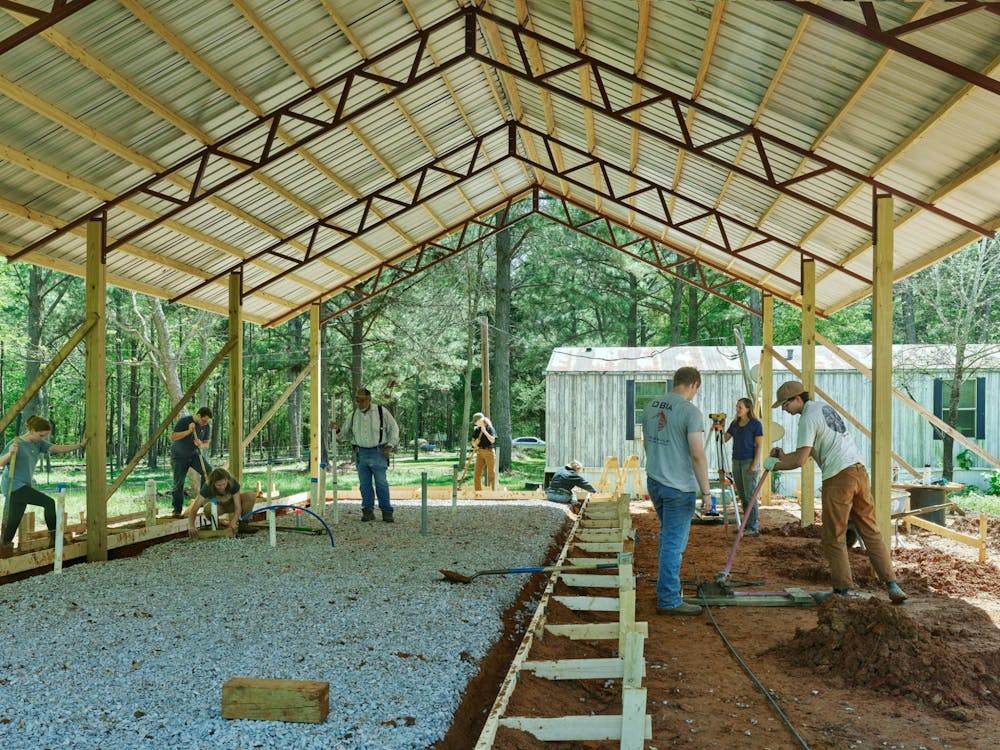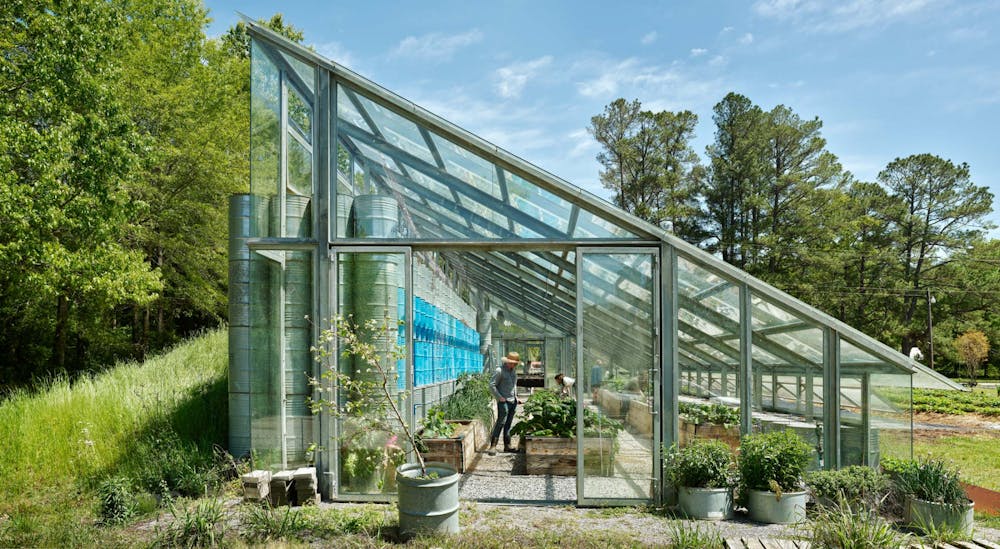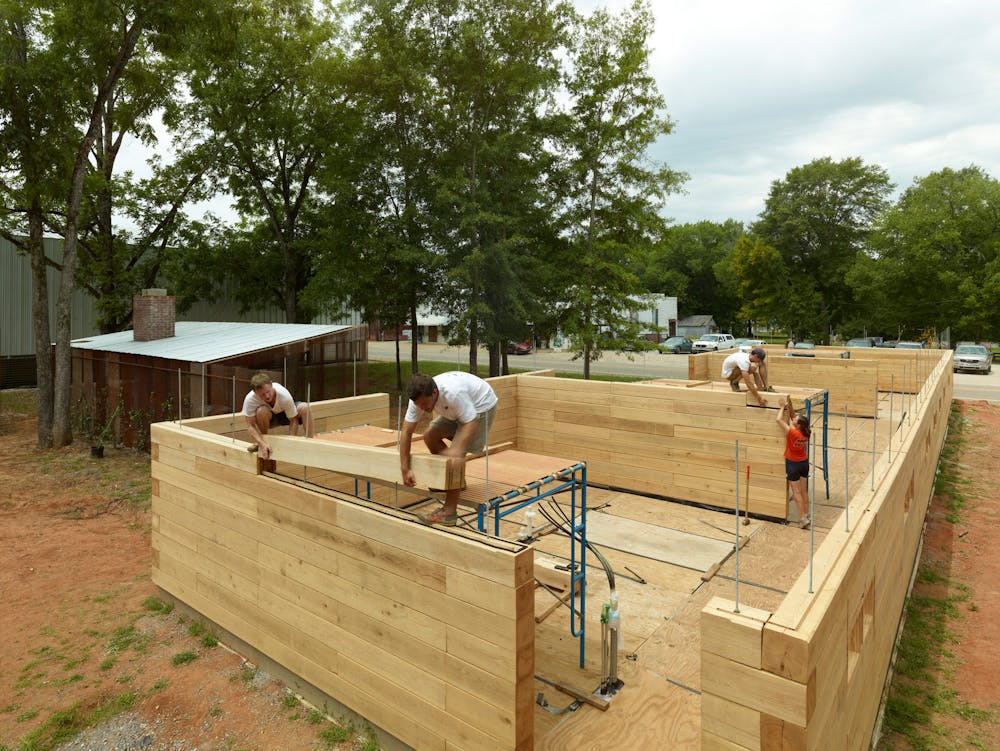Across Alabama, the landscape is littered with abandoned shops, rusted-out factories and dilapidated homes without hope of revival in small towns that have seen better days. However, a program at Auburn University aims to reverse the state's rural decline.
According to the Alabama Department of Public Health, 55 of 67 counties in Alabama are rural, and these counties hold 43.6% of the state population. Compared to the national average of 19.3%, Alabama is one of America's most rural states.
Living in a rural community has a breadth of challenges, such as a lack of access to quality food, healthcare, broadband infrastructure and dependable housing. However, Rural Studio, a College of Architecture, Design and Construction program, is doing something about it.
Based in Newbern, a town of 221 residents, Rural Studio is an award-winning program that uses architectural design to build resiliency in rural communities. It sits at the crossroads of theoretical academia and practical application.
Over the past 30 years, Rural Studio has become a member of the rural communities it was created to support. As a result, it has inherited the same grit and determination that has kept the rural population of the United States at 75 million for the last 125 years.
“I think I've learned more at Rural Studio than I have any other studio within the architecture program,” said recent graduate Laurel Holloway. “It's completely hands-on.”
Holloway is a member of a four-person team that began the “Patriece’s Home” project in September 2021, the fall semester of their last year at Auburn. The project will provide a community member with a maintainable two-story house for them and their family.
The team designed the building’s concept, coordinated with the client and contractors, laid the foundation and will drive the final nail. Rural Studio builds all its projects following this model.
“Normally, architecture students just draw stuff,” said Andrew Freear, professor of architecture and director of Rural Studio. “They're getting an incredible experience, learning how to put something together and manage a project, manage a budget and manage conversations with consultants.”
Students in the program also take support classes, like a history of wooden buildings, or they learn the hands-on skills necessary to complete a job, such as welding and carpentry.
“The students get remarkable hands-on opportunities out here that's quite amazing,” Freear said. “I would have loved to have been out here as a student.

Rosie's Home, which is currently under construction by third-year students, is estimated to be completed by April 2023.
The “Patriece’s Home” team will stay with the project until it is completed despite graduating in the spring before their client can move in. It is so common for students in the program to continue their work past graduation that they are lovingly called "leftovers."
Critically, Rural Studio doesn't observe its surroundings from an isolated place. The program has lived and worked in Newbern since Samuel Mockbee and D.K. Ruth co-founded the studio in 1993.
“I remember when I came here, there was a big amount of mistrust in academics,” Freear said. “[Academics] would come to this part of the world, they would do their research, they get tenure, and then they can disappear again, and we haven't."
Students and faculty also live in Newbern as a function of their studies and work.
“It's really expected that you'll be part of a community,” said Judith Seaman, a third-year instructor. “We get jobs in the area. We rent apartments in town… we're not a helicopter program. We’re rooted here. I worked at the library locally that we actually built about a decade ago.”
By embedding in the community, the members of Rural Studio gain perspective on rural living outside their degree program. For example, one of the persistent challenges of rural life is limited access to fresh foods.
Defined by the USDA as a low-income tract where a substantial number or substantial share of residents does not have easy access to a supermarket or large grocery store, food deserts are places where people have trouble purchasing fruits and vegetables among other nutrition.
Despite its proximity to the agricultural industry, Newbern is considered a food desert. However, reflecting the can-do attitude of their community, members of Rural Studio began growing vegetables in their front yard 13 years ago.

Architecture students pitch in at Rural Studio Farm. For more than a decade, hundreds of students have contributed to Rural Studio Farm's work.
“My dean said ten years ago, ‘why are we doing this? We're architects, we're not farmers,' and we basically said, this is out of necessity,” Freerar said. “We can drive 10 miles to get kind of prepackaged processed foods, or we can start to grow it. So why not make it an educational thing?”
Each morning at 6:30 a.m., students at Rural Studio start their day by helping to grow the 7,000 lbs. of food their community farm produces annually. The food is both eaten by students and shared with surrounding communities.
While the farm doesn't solve the food desert crisis, it does help students understand the space around them; it also helps, in a small way, to protect a vital part of Southern tradition.
“Our small communities have started to look all the same because they've all gotten a McDonald's and the Kentucky Fried Chicken, and a lot the mom-and-pop places have gone," Freear said. “There's a culture of Southern cooking that's been lost because of that.”
Despite the challenges rural communities face, their members continue to come together to solve the problems they face, and Rural Studio is no exception.
“People involved in agriculture and policy and community health and all kinds of fields can be involved in a similar way in their communities and work to affect it on a small scale that becomes kind of a larger system,” Seaman said.
Do you like this story? The Plainsman doesn't accept money from tuition or student fees, and we don't charge a subscription fee. But you can donate to support The Plainsman.
Ethan Flynn, sophomore in journalism and finance, is the campus editor at The Auburn Plainsman. He has been with The Plainsman since Fall, 2022.





